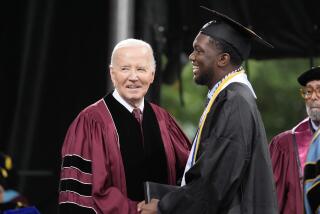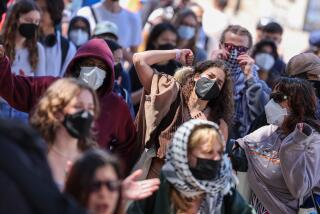Kerry Hits Colleges in Pursuit of Youth Vote
DURHAM, N.H. — As he kicked off a weeklong series of rallies on college campuses, Sen. John F. Kerry said Monday that President Bush’s approach in Iraq had put U.S. soldiers in the line of fire with little backing from their allies.
“Our young men and women in uniform, who are extraordinary ... deserve the support of a policy that doesn’t just leave them exposed, almost alone,” Kerry told hundreds of supporters gathered in a cavernous sports arena here at the University of New Hampshire.
With his comments, the presumptive Democratic nominee hewed carefully to the stance he has taken since the recent bout of fighting erupted in Iraq: a mixture of praise for the troops and strong criticism of the Bush administration’s handling of the war.
On Monday, Kerry reiterated his belief that the U.S. should collaborate with the United Nations and the international community to quell the conflict.
“If I were president today, right now today, I would be going very directly to the United Nations,” he told about 40 students in a foreign policy class at the university.
“I would summon the world to an effort that I think the world has a stake in. And I would be prepared to turn over to the U.N. the authority for the political transformation of Iraq and for the reconstruction of Iraq.”
Bush campaign spokesman Steve Schmidt called Kerry’s remarks hypocritical.
“John Kerry left America’s fighting men and women exposed when he voted against the $87-billion supplemental [legislation] that included money for body armor and increased combat pay,” he said.
The Massachusetts senator spoke extensively about Iraq during his visit to the university, the first time he has returned to New Hampshire since winning his party’s primary in the state on Jan. 27.
After the rally, while shopping at the campus bookstore, Kerry declined to comment on an Aug. 6, 2001, memo to the president about possible terrorism activity in the U.S. The memo was released to the public Saturday. He also declined comment on testimony presented to the Sept. 11 commission last week.
“I haven’t read all the testimony and I haven’t seen a lot of it, and ... I don’t want to politicize it,” he said. “They need to digest it. I want to see what they say.”
Kerry’s campaign billed the trip to Durham as the kickoff to a sustained effort to mobilize young voters before November. A campaign news release said he would preview a “compact with the next generation” with a call to service that echoed that of President Kennedy, who created the Peace Corps in 1961.
Kerry did mention his previously announced plan for funding college tuition for students who work two years in their communities, but he acknowledged that the program would not be as extensive as he would like because of the federal deficit.
He did not go into details about how he would appeal to young voters. Instead, he asked the assembled students to get involved in the campaign.
“I know that people are disaffected,” he said. “I know a lot of your friends laughed at you probably because you go to a rally.” But, he added, “change begins with you.”
The 500-plus students in the arena audience, many of whom had waited more than an hour for Kerry to speak, applauded respectfully though not enthusiastically.
Meanwhile, Kerry’s campaign attempted Monday to reinforce the argument that life has gotten worse for middle-class families under Bush, releasing an in-house study.
The traditional “misery index” measures the combination of unemployment and inflation, and was cited often during the Carter administration as an expression of the country’s economic malaise. In 1976, the misery index was set at 100.
Kerry’s advisors said they calculated a new middle-class misery index to show a snapshot of “kitchen table pocketbook issues.” They defined “middle class” as those families earning up to $200,000 a year.
“This certainly provides a more illuminating picture of the economic trends that are impacting typical working families,” said Gene Sperling, a former Clinton advisor who helped compile the index.
The Kerry misery index measures factors such as median family income, bankruptcies and home-ownership rates.
The campaign team concluded that because of an increase in the costs of college tuition and healthcare premiums, as well as a drop in family income, the middle-class misery index had worsened by 13 points under Bush -- the biggest three-year decline in the 27-year period they measured.
The Bush campaign rebuffed the measurement as “bogus.” “John Kerry has made up a false measurement to support his ongoing efforts to talk down the economy,” Schmidt said.
More to Read
Get the L.A. Times Politics newsletter
Deeply reported insights into legislation, politics and policy from Sacramento, Washington and beyond. In your inbox three times per week.
You may occasionally receive promotional content from the Los Angeles Times.










